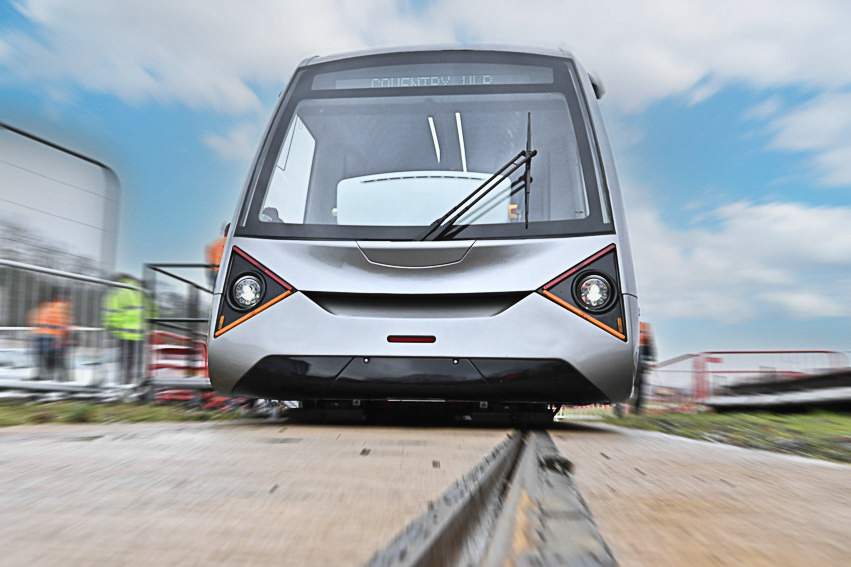As the deliberations end and BCIMO awaits the arrival of Cohort 2 of the Clean Futures programme – and so the range of exciting innovations their new SMEs will bring to the rail sector – we reflect on where the sector is at the moment and, most importantly, the track it’s on.
On Tuesday 16th July, BCIMO’s Strategic Business Partnerships Manager, Martin Little, visited Leeds to attend the Railway Industry Association (RIA) North’s Light Rail Member Interest Group meeting, which focused on light rail plans across West Yorkshire, and more broadly best practice from across the UK and further afield. With new political leadership, new priorities and new plans afoot in the capital, the North, like other regions, is focused on opportunities for more local development, and transport is, as always, high on the agenda.
The meeting was opened by Luke Albanese of West Yorkshire Combined Authority, on behalf of Mayor, Tracy Brabin, who recently launched a public consultation on mass transit. The intention is to bring trams back to Leeds and Bradford, the plans and routes for which have just been announced. Andy Lucas, from Mainspring, then gave an overview of the market for light rail in the UK and overseas, along with upcoming supply chain opportunities; followed by James McCaffrey of Stadler UK, on their involvement with the Merseyrail and Nexus metro systems, illustrating the innovative approaches that have expanded their UK fleet share. Adam Bevan from the University of Huddersfield, outlined his institution’s international expertise in light rail research and development.


With Martin and BCIMO then in the spotlight, he reflected on the History of Rail from its beginnings more than two centuries ago to its growth, decline and re-emergence as a cleaner, greener form of transport in the face of climate change. He highlighted the range of political and thus legislative environmental drivers, from the Climate Change Act amendment in 2019 to create a net-zero emissions target for 2050, through to a series of transport-specific strategies and plans. All have a clear aim of decarbonising through both mitigation and innovation, and now an imperative as passenger numbers return to pre-covid levels, and thus a return to the pressure on the UK’s rail network. But his main focus for discussion was the business case for ‘very light rail’ or ‘VLR’.
BCIMO’s rail offering within the UK encompasses all its different forms. ‘Heavy rail’, by which the sector is usually defined, operates on the national rail network within dedicated spaces to avoid interaction with other traffic, and so-called because it carries heavy loads. ‘Light rail’ typically operates in urban environments, sharing spaces with other traffic and carrying lighter loads – there are currently eight systems in the UK, including the West Midlands Metro. The emerging VLR industry, the development of which underpins BCIMO’s core mission, is a new form of light rail that exploits the transfer of technology from the automotive industry, with a focus on more localised services and, predominantly, with infrastructure and vehicles designed to operate within the confines of small cities and large towns.
With innovative potential across all aspects of the rail sector, there is a clear vision being defined within the UK for multi-modal, low-carbon end-to-end services. In sharing this ambition, BCIMO has illustrated a potential journey in the future of public transport from ‘Hub-to-Home’.
Although some VLR systems have already been developed on the global stage, the first UK-based system is being developed by Coventry City Council – and BCIMO is playing a key role as the test bed for both the infrastructure and vehicle aspects of the project at its landmark Very Light Rail National Innovation Centre (VLRNIC) in Dudley. Further interest in VLR has been expressed by stakeholders in other towns and cities, and indeed its potential to provide services in rural environments via rail lines which were decommissioned during the Beeching cuts of the 1960s.
There is undoubtably a clear business case for rail as a key form of public transport in general, with further economising and ‘greening’ of the sector going forward both possible and essential, as a strategy to viably meet net-zero targets. But VLR specifically is an even more financially and environmentally sustainable solution, with a range of significant technological advancements through which the niche is now differentiating. These include the unique design of VLR vehicles to be lightweight, using composite materials, which in turn could be from recycled sources and ultimately recyclable, and the option to use new and emerging power sources, for both propulsion and auxiliary systems, such as battery charged from renewables, or biofuel or hydrogen.


From a broader systems perspective, the Coventry VLR project utilises innovative construction methods, such as ultra-high performance concrete, which reduces the depth of excavation for track; on-board propulsion, which negates the need for overhead power lines to be installed or maintained; off-the-shelf components and cross-sector technologies which can be combined and utilised to build effective management systems; and on-street operation can enhance interoperability with existing and emergent facilities, such as other public transport and micromobility systems. And there remains potential for further innovation and thus development, via blue-sky ideas and cross-sector application, not least through BCIMO’s role in the Clean Futures programme and its vital engagement with key rail industry stakeholders… more on this coming soon.
So as those ‘clean futures’ are considered throughout the rail sector, within a broader transport scope, and throughout the realms and regions of the UK – with challenges clear and ever increasing – the plethora of opportunities for those operating or indeed aspiring to operate across this established yet evolving industry, are ever increasing too. For BCIMO, it is the reason why ‘Challenges & Opportunities of the Future’ remains a core area of focus – again, more to come on each of these foci in due course.

Tracy Brabin, the Mayor of West Yorkshire, clearly outlining her vision for light rail in a recent video on social media, stated:
“A crucial part of our growth mission, Mass Transit will transform the transport options available to the people of West Yorkshire, as well as attracting investment into the region and boosting our economy. We want to create a better-connected West Yorkshire, with a Mass Transit system that is affordable, easy to use, and safe and secure for all.”

Commenting on social media on the Mayor’s earlier announcement of plans for the initial Leeds to Bradford service, Managing Director of UK Tram, James Hammett, said:
“Great to see these exciting plans. Looking forward to supporting all the team at WYCA going forward.”

Martin Little, Strategic Business Partnerships Manager at BCIMO, reflecting on his presentation to the Light Rail Group North, commented:
“Very Light Rail is a whole new market in prospect that presents significant opportunity as a UK specialism, with considerable export potential. Coventry City Council’s scheme being the UK pilot, VLR intends to supplement rather than replace existing transportation services, forming integrated connectivity for mid-volume passenger transit between expanding outlying residential communities and central urban facilities.
“Affordability being a fundamental driver for the use case, a bespoke vehicle and infrastructure combination is currently in advanced development.”
For more information on BCIMO and the VLRNIC please visit the BCIMO Website or Contact Us to make an enquiry.

BCIMO is a not-for-profit Research and Technology Organisation (RTO) and operator of the Very Light Rail National Innovation Centre (VLRNIC), a unique, world-class centre for rail innovation based in Dudley in the West Midlands.

Google Map Location: BCIMO
what3words Address: ///shades.glue.tile
Sat Nav: DY1 4AL
Postal Address: BCIMO, Very Light Rail National Innovation Centre, Zoological Drive, Dudley. DY1 4AW
Email: info@bcimo.co.uk
Phone: 07769 586893
